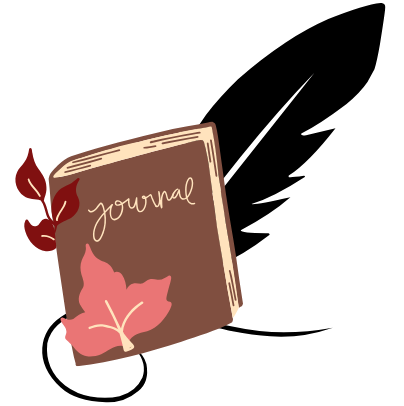The Importance of Pen and Paper
Journaling is a powerful tool for self-discovery, personal growth, and emotional healing. As someone who has been journaling for quite a few years now, I can confidently say that it has been one of the most transformative practices in my life.
It’s helped me navigate through tough times, celebrate my victories, and gain insights that I never would have discovered otherwise.
Whether you’re a seasoned journal-keeper or a finish novice, this guide will provide you with the tools and techniques to take your journaling practice to the next level.
The Science Behind Journaling: How Writing Shapes Our Minds
The benefits of journaling are backed by solid research. Studies have shown that regular journaling can reduce stress, improve immune function, and even help wounds heal faster.
When we write, we engage both hemispheres of our brain. The right hemisphere, responsible for creativity and emotion, works in tandem with the left hemisphere, which handles logic and analysis.
This full-brain workout helps us process experiences more effectively, leading to greater self-awareness and emotional intelligence.
The act of writing itself can be a form of exposure therapy. By repeatedly confronting our thoughts and feelings on paper, we can desensitize ourselves to painful memories and reduce their emotional impact over time.
This is particularly useful for those dealing with trauma or anxiety.
Getting Started: Choosing Your Journaling Method
Finding the right journaling method for you is crucial for maintaining a consistent practice. Here are some popular options:
Traditional Pen and Paper
The tactile experience of writing in a physical journal can help slow down your thoughts and encourage deeper reflection. Many people find that handwriting allows for a more intimate connection with their thoughts and feelings.
Plus, there’s no risk of digital distractions when you’re writing in a notebook.
Digital Journaling
If you’re always on the go or prefer typing to writing by hand, digital journaling might be your best bet. Apps like Day One, Journey, or even a simple note-taking app can serve as your digital journal.
The advantage here is searchability and the ability to add multimedia elements like photos or voice notes.
Digital journals are also easier to back up and keep secure.
Bullet Journaling
For those who love organization and creativity, bullet journaling offers a unique blend of planning and reflection. This method, created by Ryder Carroll, allows you to track habits, set goals, and journal all in one place.
It’s highly customizable and can be adapted to suit your specific needs and preferences.
Guided Journals
If you’re new to journaling or struggle with knowing what to write, guided journals with prompts and exercises can be an excellent starting point. They provide structure and direction while still allowing for personal exploration.
Many guided journals focus on specific themes like gratitude, self-discovery, or goal-setting.
The Art of Effective Journaling: Techniques for Deeper Insights
Now that you’ve chosen your journaling method, let’s explore some techniques to help you gain more meaningful insights from your practice.
Stream of Consciousness Writing
This technique involves writing continuously for a set period without stopping to edit or censor yourself. It’s an excellent way to bypass your inner critic and access your subconscious thoughts and feelings.
Set a timer for 10-15 minutes and write whatever comes to mind, no matter how random or seemingly irrelevant.
You might be surprised by the insights that emerge.
Gratitude Journaling
Focusing on what you’re grateful for can shift your perspective and improve your overall well-being. Try writing down three things you’re thankful for each day, no matter how small they may seem.
This practice can help rewire your brain to focus more on the positive aspects of your life, leading to increased happiness and resilience.
Dialogue with Your Inner Self
Engage in a written conversation with different aspects of yourself. This could be your inner child, your future self, or even a personified emotion.
This technique can help you gain new perspectives on your thoughts and feelings.
For example, you might write a letter to your anxiety, asking it what it’s trying to protect you from, and then respond as your anxiety.
Cognitive Restructuring
Use your journal to challenge negative thought patterns. Write down a negative thought, then list evidence for and against it.
This can help you develop a more balanced and realistic perspective.
For instance, if you find yourself thinking “I’m a failure,” write down specific examples of times you’ve succeeded or overcome challenges.
Goal Setting and Reflection
Use your journal to set both short-term and long-term goals. Regularly reflect on your progress, adjusting your strategies as needed. This can help you stay motivated and accountable.
Break down larger goals into smaller, actionable steps and use your journal to track your progress and celebrate your achievements along the way.
Overcoming Common Journaling Challenges
While journaling can be incredibly rewarding, it’s not without it’s challenges. Here are some common obstacles you might face and how to overcome them:
Consistency
One of the biggest challenges is maintaining a consistent journaling practice. To overcome this, try tying your journaling to an existing habit, like having your morning coffee.
Start small – even just five minutes a day can make a difference.
Remember, consistency is more important than quantity. It’s better to write a little bit every day than to write a lot once a week.
Writer’s Block
If you’re staring at a blank page feeling stuck, try using prompts. There are countless journaling prompt books and websites available.
Or, simply start by writing about your day – what you did, how you felt, what you observed. Sometimes, the act of writing anything can help get the creative juices flowing.
Privacy Concerns
If you’re worried about others reading your journal, consider keeping a digital journal with password protection. For physical journals, you could use a simple code or shorthand that only you understand.
Remember, your journal is a safe space for you to express yourself freely, so finding a way to confirm your privacy is crucial.
Perfectionism
Your journal is for your eyes only. It doesn’t need to be perfect.
Let go of the need for perfect grammar, handwriting, or profound insights.
The value is in the process, not the product. Your journal is a tool for growth and self-discovery, not a work of art to be judged.
Advanced Journaling Techniques for Deeper Growth
As you become more comfortable with regular journaling, you might want to explore some more advanced techniques to further your personal growth journey.
Shadow Work
Shadow work involves exploring the parts of ourselves that we typically keep hidden or repressed. Use your journal to explore your fears, insecurities, and the aspects of yourself that you find difficult to accept. This can lead to profound self-understanding and integration. Start by writing about a trait you dislike in others and explore how it might be a reflection of a part of yourself you’ve disowned.
Future Self Journaling
Imagine yourself five, ten, or twenty years in the future. Write a detailed description of your ideal future self, including your accomplishments, lifestyle, and personal growth.
This can help clarify your long-term goals and motivate you to work towards them.
Regularly check in with this future self through your journal, asking for advice or guidance.
Emotional Regulation Journaling
When you’re experiencing intense emotions, use your journal as a tool for regulation. Write about the emotion, it’s intensity, what triggered it, and how you’re experiencing it in your body.
Then, explore healthier ways to respond to the situation.
This technique can help you develop greater emotional intelligence and self-control.
Creativity Boosting
Use your journal for creative exercises. Try writing poetry, sketching, or creating mind maps.
These activities can help unlock new ideas and perspectives, even if you don’t consider yourself particularly artistic.
The goal is to engage different parts of your brain and explore new ways of expressing yourself.
Integrating Journaling with Other Personal Growth Practices
Journaling can be a powerful complement to other personal growth practices. Here are some ways to mix journaling with other techniques:
Meditation and Journaling
After a meditation session, use your journal to record your experiences, insights, and any challenges you faced.
This can deepen your meditation practice and help you track your progress over time. You might notice patterns in your thoughts or emotions that you hadn’t been aware of before.
Therapy and Journaling
If you’re in therapy, journaling can be an excellent way to continue processing between sessions. You can bring your journal entries to talk about with your therapist, providing valuable material for your work together.
Your journal can also help you prepare for therapy sessions by clarifying what you want to talk about.
Goal Setting and Journaling
Use your journal to break down larger goals into smaller, actionable steps. Regularly review and adjust your goals, celebrating your progress along the way.
Your journal can serve as a roadmap for your personal growth journey, helping you stay focused and motivated.
The Continuous Journey: Making Journaling a Lifelong Practice
As you continue your journaling practice, remember that this involves the process of self-discovery and growth. Be patient with yourself, and allow your practice to evolve as you do.
Experiment with different techniques, be open to what emerges, and most importantly, enjoy the process.
Your journal is a safe space for you to explore, dream, and grow. It’s a powerful tool for personal transformation, but it’s also deeply personal.
Make it your own, and let it be a reflection of your unique journey.
Remember, the most important step is simply to begin. So grab your journal, pick up your pen, and start writing. Your future self will thank you for it.
Exploring Different Journaling Styles
While we’ve covered some basic journaling methods, there are many more styles you can explore to find what resonates with you:
Art Journaling
This style combines writing with visual art. You don’t need to be an artist to benefit from this approach.
Use colors, shapes, and images to express your feelings and thoughts.
Collage, doodle, or paint alongside your written entries. This can be particularly helpful for processing complex emotions or experiences that are difficult to put into words.
Dream Journaling
Keep your journal by your bedside and write down your dreams as soon as you wake up. Over time, you might start to notice patterns or recurring themes in your dreams.
This can provide insights into your subconscious mind and help you process unresolved issues.
Travel Journaling
Whether you’re on a weekend getaway or a long-term adventure, keeping a travel journal can enhance your experiences.
Write about the places you visit, the people you meet, and the insights you gain. Include sketches, ticket stubs, or pressed flowers to create a rich, multi-sensory record of your travels.
Productivity Journaling
Use your journal to track your daily tasks, habits, and goals. This can help you stay organized and motivated. You might include sections for your to-do list, your accomplishments for the day, and reflections on your productivity.
Unsent Letter Journaling
Write letters to people in your life (or even to yourself) that you don’t intend to send. This can be a powerful way to process your feelings, work through conflicts, or express things you might not feel comfortable saying in person.
Deepening Your Journaling Practice
As you become more comfortable with regular journaling, you can start to use your journal as a tool for deeper self-exploration and personal growth.
Identifying Patterns and Themes
Periodically review your journal entries to look for recurring themes or patterns in your thoughts, feelings, and behaviors. This can help you identify areas of your life that might need attention or change.
Challenging Your Beliefs
Use your journal to question and challenge your long-held beliefs and assumptions. Write about where these beliefs came from and whether they still serve you.
This can be a powerful way to break free from limiting beliefs and expand your perspective.
Exploring Your Values
Spend some time journaling about your core values. What matters most to you?
How are you living in alignment with these values?
Where might there be discrepancies between your values and your actions?
Cultivating Self-Compassion
Practice self-compassion in your journaling. When writing about challenges or mistakes, try to approach yourself with kindness and understanding.
Write as if you were talking to a dear friend.
Celebrating Your Wins
Make sure to use your journal to celebrate your accomplishments, no matter how small. This can help build self-esteem and motivation.
Write about what you’re proud of and why it matters to you.
Overcoming Advanced Journaling Challenges
As your practice deepens, you might encounter some new challenges:
Dealing with Difficult Emotions
Sometimes, journaling can bring up intense or uncomfortable emotions. It’s important to have strategies in place for self-care.
This might include setting boundaries around your journaling time, having a trusted friend or therapist to talk to, or engaging in soothing activities after intense journaling sessions.
Maintaining Momentum
After the initial excitement wears off, you might find it challenging to maintain your journaling practice. To keep the momentum going, try setting specific journaling goals, joining a journaling group or challenge, or experimenting with new techniques to keep things fresh.
Balancing Reflection and Action
While journaling is a powerful tool for self-reflection, it’s important to balance this with action in your real life. Use your journal to set actionable goals and track your progress towards them.
Avoiding Over-Analysis
While self-reflection is valuable, it’s possible to get stuck in over-analysis. If you find yourself ruminating on the same issues without making progress, try shifting your focus to solution-oriented journaling or gratitude practices.
The Role of Technology in Modern Journaling
While traditional pen-and-paper journaling has it’s charms, technology has opened up new possibilities for journaling:
Voice Journaling
For those who prefer speaking to writing, voice journaling apps allow you to record your thoughts and feelings. Some apps even transcribe your entries, making them searchable.
Photo Journaling
Apps like Day One make it easy to incorporate photos into your journal entries. This can be a great way to capture memories and add visual context to your written entries.
AI-Assisted Journaling
Some apps now use artificial intelligence to analyze your journal entries and provide insights or prompts based on your writing. While this can be helpful, it’s important to maintain a critical perspective and not rely too heavily on AI interpretations.
Encrypted Digital Journals
For those concerned about privacy, there are now highly secure digital journaling options that use encryption to protect your entries.
The Broader Impact of Journaling
While journaling is often seen as a personal practice, it’s benefits can extend beyond the individual:
Improving Relationships
By helping you understand yourself better, journaling can lead to improved relationships with others. You might gain insights into your patterns of behavior or communication that you can then work on improving.
Enhancing Creativity
Regular journaling can boost your overall creativity. The practice of expressing yourself freely on the page can translate into greater creative confidence in other areas of your life.
Boosting Professional Performance
Many successful people attribute part of their success to regular journaling. It can help clarify your professional goals, work through challenges, and track your progress over time.
Contributing to Mental Health
While journaling is not a substitute for professional mental health care, it can be a valuable complement to therapy and other mental health practices. Many therapists recommend journaling as a way to continue processing between sessions.
Frequently Asked Questions
How often should I journal?
The frequency of journaling depends on your personal preferences and schedule. Some people find daily journaling most useful, while others prefer weekly or as-needed journaling.
The key is to find a rhythm that works for you and that you can maintain consistently.
What’s the best time of day to journal?
There’s no universally “best” time to journal. Some people prefer morning journaling to set intentions for the day, while others find evening journaling helpful for reflecting on the day’s events.
Experiment with different times to see what feels most natural and useful for you.
How long should my journal entries be?
The length of your journal entries can vary greatly depending on your mood, available time, and what you’re writing about. Some days you might write pages, while other days a few sentences might suffice.
There’s no “right” length – what matters is that you’re engaging in the practice regularly.
Can journaling replace therapy?
While journaling can be a powerful tool for self-reflection and personal growth, it’s not a substitute for professional mental health care. If you’re dealing with serious mental health issues, it’s important to seek help from a qualified therapist or counselor.
Journaling can, however, be a valuable complement to therapy.
What if I’m worried about someone reading my journal?
Privacy is a common concern for many journalers. If you’re worried about someone finding and reading your physical journal, consider keeping it in a locked drawer or using a digital journaling app with password protection.
Some people also use code names or symbols to add an extra layer of privacy to their entries.
Can I journal on my computer or phone?
Absolutely! Digital journaling can be just as effective as traditional pen-and-paper journaling.
Many people find it more convenient, especially if they type faster than they write by hand.
There are many journaling apps available that offer features like password protection, cloud syncing, and the ability to add photos or voice notes to your entries.
What if I miss a day (or several) of journaling?
Missing days in your journaling practice is completely normal and nothing to feel guilty about. Life happens, and there will be times when journaling isn’t possible or doesn’t feel like a priority.
The important thing is to return to your practice when you can, without judgment.
Remember, journaling is a tool for your benefit, not a chore or obligation.
How can I make journaling a habit?
To make journaling a habit, try tying it to an existing routine (like having your morning coffee or getting ready for bed), setting a specific time each day for journaling, or using habit-tracking apps or methods. Start small – even just a few minutes a day can help establish the habit.
What if I don’t know what to write about?
If you’re feeling stuck, try using journaling prompts, writing about your day, or starting with a simple gratitude list. You can also write about your current feelings, goals, or challenges you’re facing.
Remember, there’s no “wrong” way to journal – whatever you write is valid and valuable.
Can journaling help with specific issues like anxiety or depression?
Many people find journaling helpful for managing symptoms of anxiety and depression. It can provide an outlet for difficult emotions, help identify thought patterns, and promote problem-solving.
However, it’s important to remember that journaling is not a substitute for professional mental health treatment.
If you’re struggling with mental health issues, consider combining journaling with therapy or other treatments recommended by a healthcare professional.
Key Takeaways:
- Journaling is a scientifically-backed method for personal growth and emotional well-being
- Choose a journaling method that works for you, whether it’s traditional, digital, or guided
- Experiment with different techniques like stream of consciousness writing, gratitude journaling, and cognitive restructuring
- Overcome common challenges like consistency and writer’s block with practical strategies
- Integrate journaling with other personal growth practices for most benefit
- Remember that journaling is a habit to infuse into your life, not a one-time goal to reach – enjoy the process of self-discovery




